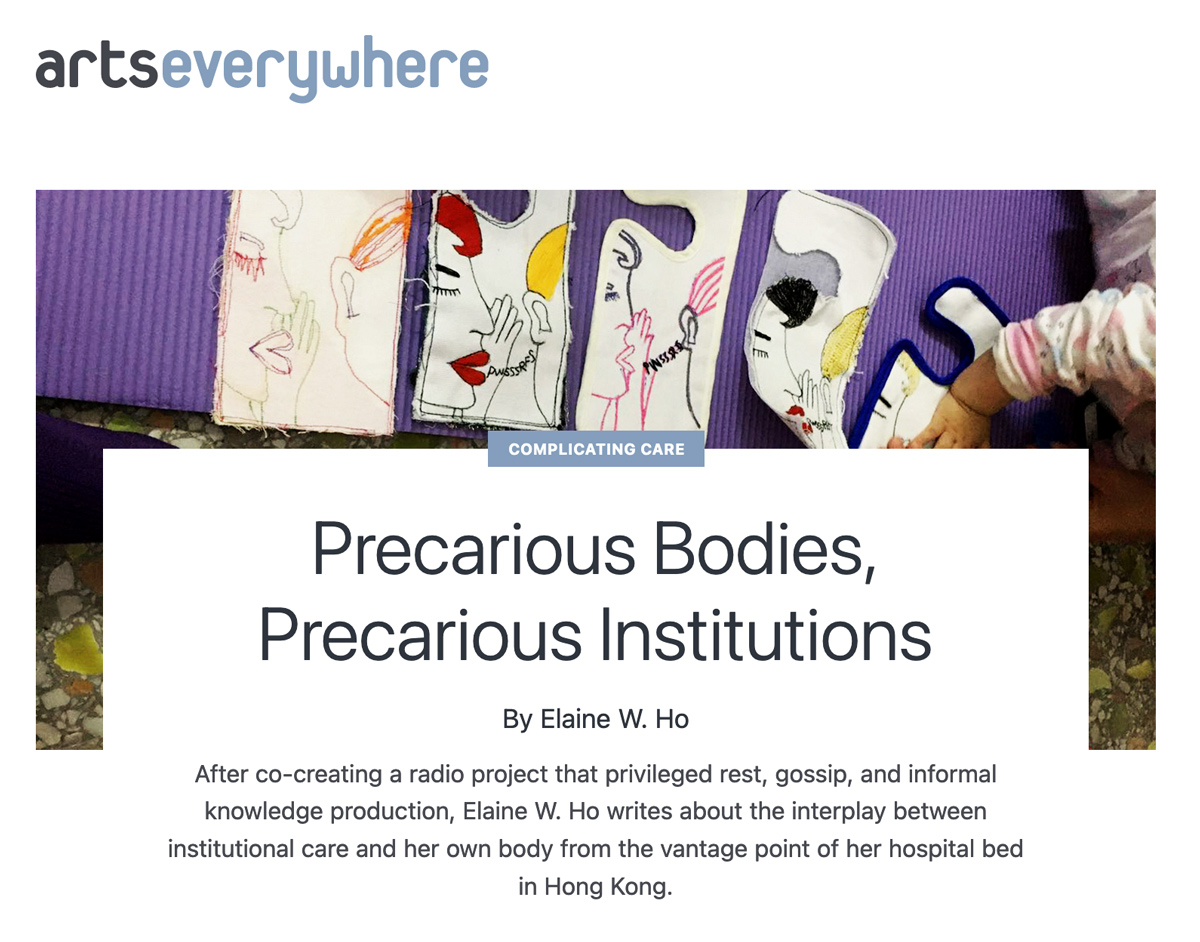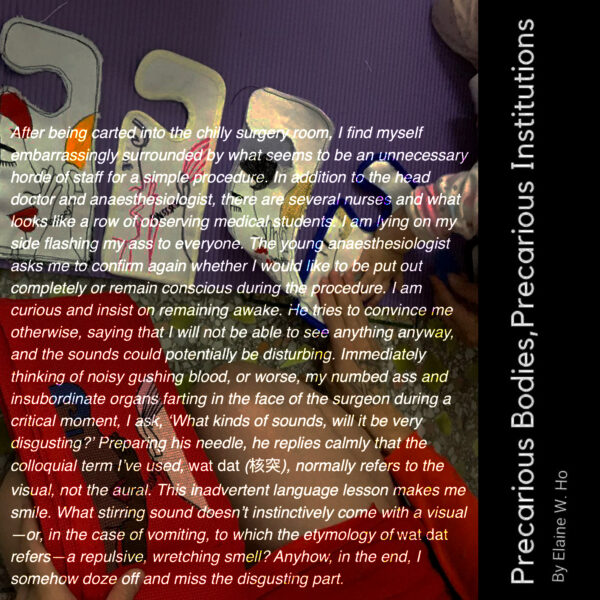Middle sister as 二 as ever in a new ‘aesthetic projection‘ published for the ‘Complicating Care‘ series of texts published by ArtsEverywhere (full text here):
Gossip, sleepovers, and care: a precursor to Elaine W. Ho’s “Precarious Bodies, Precarious Institutions”
by Anna BOWEN (first published in edited form at ArtsEverywhere.ca)
Imagine that you are in a nest made of bedsheets strung up with rope from your ceiling above an island built of a thousand caressing pillows. Situate your body in that space. Yes, it is dark but there is a string of miniature disco balls which sparkle in your eyes, keeping us cozy and smiling together as we move, warm and intimate,” narrates Amy Suo Wu as part of online aural art space Radio Slumber.[1]
Informal gatherings outside of marketable holidays have been notably absent from public discussion as Covid-19 restrictions have expanded and contracted over the past year, at least in Canada where I reside. Can I have a sleepover? Has been a familiar refrain over the last few years from my eight-year-old daughter and her friends, the tenderness of sleeping beside each other in pajamas, otherwise only seen in the private space of the home, and the possibility for late night gossip embodying a profound desire for closeness, made more urgent by the separation experienced through lockdown. Similarly, guidance on essential gatherings of friends, preparing and sharing food together, for example, has been overridden in the public discourse and national news cycle by the economy and what it needs to survive through the pandemic. Opening restaurants, bars, hair salons, and gyms has clearly taken priority over communicating the possibility for potlucks, gatherings, cooking for each other—and slumber parties.
Radio Slumber—a series of radio pieces, or séances, and an online “grimoire” by Hong-Kong-based Elaine W. Ho and Rotterdam-based Amy Suo Wu—are the outcome of a residency focused on an “endotic” investigation and attentiveness, that is, looking inward to the everyday, to the ordinary as opposed to the exotic. The residency was part sleepover, part social-practice art, part “diasporadic” coven, and part study group. A warm place open for rest and gossip, the time was shared by a group of female artists and academics from the Asian diaspora in what they dub pwsssrfs—naturally, “potluck workshops + secret societies + spa retreats + fests of slumber”—and took place at Motel Spatie in Arnhem, Netherlands, during the winter of 2020.
In my own broader circles, the notions of séances, the unseen, covens, and alchemy, still provoke discomfort and disorientation—with the exception of where radical, predominantly white-Anglo friends are working their way towards relating to the cycles of the nonhuman through academia or ritual. My own sense of “gossip” is usually tied to a protestant moralistic distaste for “talking behind peoples’ backs.” But Radio Slumber brings back into focus the way that “sharing informal knowledges within female friendships [is or can be] a political act of solidarity within a patriarchal model that seeks to disrupt its existence.”[2] They open up of a space for gossip, wondering whether it might exist as a “noninstitutional informal space of knowledge production”[3] and how or even if that knowledge production, in turn, can be or shared publicly.
The group engages Silvia Federici’s proposal that it is in part words “frequently used to define and degrade women” which serve to operationalize and reproduce gender oppression, with history of gossip being an “emblematic” example. At the turn of modernity in Europe, alongside the violent extraction of so-called witches from communities, gossip became a term that instead of representing close female friendship “turned into one signifying idle, backbiting talk, that is, talk potentially sowing discord, the opposite of the solidarity that female friendship implies and generates.”[4]
Radio Slumber shies away from productivity and performance, instead engaging in mutual vulnerability, whispered linkages, a “bond of care and friendship as methodology.” They explain, “We attempted to put what was urgent into practice: the act of care, friendship, rest, and solidarity. We tried to embody these gestures and take the practice of care seriously, slow down and resist the capitalist guilt of productivity.”
From within this context, the project spans from discussions about cultural theorist Rey Chow’s text, “The Fascist Longings in our Midst,” to recipes for pineapple buns—and the audio provides an immersive artefact representing the wide-spanning fertile space of the gathering. Likewise, the website and accompanying audio pieces resist linear consumption or quick glances, instead demanding a longer, immersive engagement with its bubbles of information and aural concoctions. These bubbles span everything from notes on micro-aggressions to academic papers on care (Jamie Heckert, Carol Gilligan, Leela Gandhi), from poetry by Li-Young Lee, to short video clips of sewing Radio Slumber “door cozies.” I take screenshots to remember where the bubbles are that I need to return to on this “home brewed” page, and with no other way to ingest them, resist my own impulses towards productivity and instead give in to time spent in a liminal space listening to the hours-long aural productions.
This, the fourth piece in the Complicating Care series on ArtsEverywhere.ca is written by Elaine W Ho, one of the self-proclaimed “mama-sans” of Radio Slumber. In her article “Precarious Bodies, Precarious Institutions,” Ho reflects on a different space of embodiedness and intimacy, in this case an unintended and clinical dystopian sleepover, a forced pause from productivity, in a recent hospital stay that found her dependent on the medical system. In contrast to the closeness and intimacy of Radio Slumber, Ho wonders “how governments both care for and control their citizens” through this type of institution, invoking literary theorist Lauren Berlant’s work on ‘austerity, precarity, and awkwardness.’ Ho considers how art can ride the space between institutions and the intimacy of bodies, “as something that gives care to, as well as challenges, those roles.”
Footnotes
[1] Séance 1 of www.radioslumber.net
[2] FEDERICI, Silvia
[3] Séance 2, around 01:07, from notes taken by a participant of pwsssrfs; www.radioslumber.net
[4] FEDERICI, Silvia
___
Thank you to Siddhartha JOAG for patient editing, to Anna BOWEN for the beautiful re-cap and reflections, and for Radio Slumbering one year in… This is for the beautiful, wavering infrastructures of thought of Lauren BERLANT (1957-2021),點。

